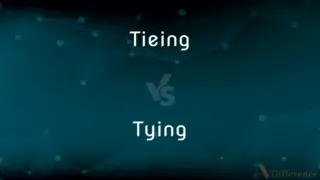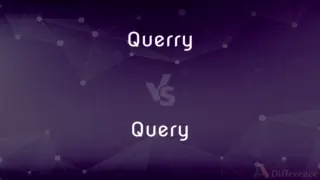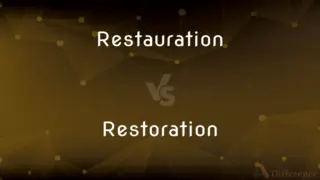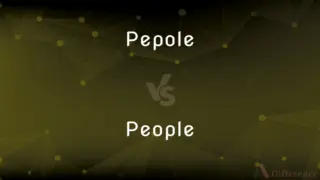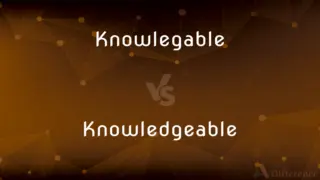Stang vs. Stung — Which is Correct Spelling?
Edited by Tayyaba Rehman — By Maham Liaqat — Updated on April 18, 2024
"Stang" is the incorrect spelling of "stung," which refers to the past tense of sting, meaning to feel a sharp pain from an insect's bite or a similar sharp pain.
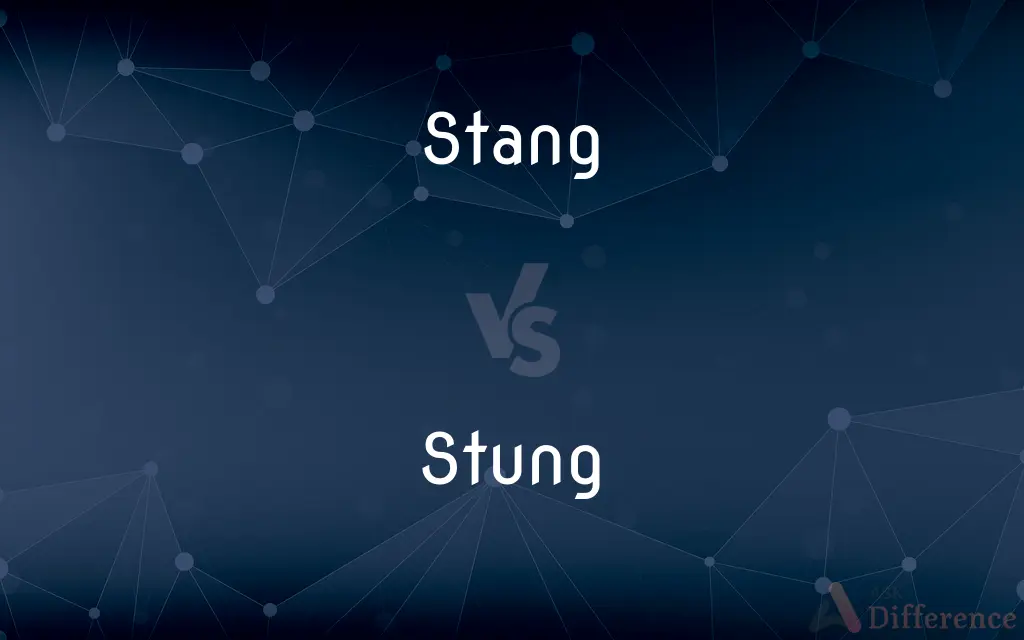
Table of Contents
Which is correct: Stang or Stung
How to spell Stung?

Stang
Incorrect Spelling

Stung
Correct Spelling
ADVERTISEMENT
Key Differences
Remember that "stung" contains a "u," which is also found in "hurt," a similar feeling you might experience when stung.
Connect "stung" with "bung," as both involve a sense of something sudden and painful, helping to recall the "u" in "stung."
"Stung" follows the typical past tense formation in English where "ing" becomes "ung" in verbs like "sing" to "sung."
How Do You Spell Stung Correctly?
Incorrect: I never knew nettles stang like that.
Correct: I never knew nettles stung like that.
Incorrect: She felt as if she had been stang by her harsh words.
Correct: She felt as if she had been stung by her harsh words.
ADVERTISEMENT
Incorrect: The jellyfish stang him when he swam too close.
Correct: The jellyfish stung him when he swam too close.
Incorrect: My arm stang after the shot.
Correct: My arm stung after the shot.
Incorrect: He said he was stang by a bee.
Correct: He said he was stung by a bee.
Stung Definitions
To incite or instigate a sharp reaction or response.
His comments stung her into responding angrily.
To feel a keenly painful emotion, as from a sharp critique.
She was stung by the criticism in the review.
To charge or overcharge for something; a term used in scams or high prices.
Tourists often get stung by local taxi fares.
Past tense of sting, used when one experiences a sharp, sudden pain, often from an insect.
He was stung by a wasp while gardening.
To be affected painfully by or as if by the sting of a physical object or remark.
His eyes stung from the smoke in the room.
Past tense and past participle of sting.
Simple past tense and past participle of sting
Feeling sharp psychological pain;
Stung by the remark, she retorted angrily
Stung Meaning in a Sentence
I was stung by a mosquito last night.
My eyes stung from chopping onions.
We were stung by the high prices at the tourist spot.
She felt stung by their lack of faith in her abilities.
The rejection from her friends stung more than she expected.
They were stung into action by the urgent need for change.
The cold wind stung their faces as they walked outside.
His dismissive words really stung her feelings.
The boxer was stung by a quick jab to the chin.
She was stung by the realization that she had been lied to.
I’ve been stung by bees three times this summer.
The spicy sauce stung his lips.
The criticism from his boss stung, but it was necessary.
He got stung by a jellyfish during his vacation.
Her tears stung her cheeks as she cried.
The salt water stung the cut on her leg.
His pride was stung when he was overlooked for the promotion.
The icy spray from the waves stung our faces.
The wind stung any exposed skin with its frosty bite.
The harsh reality of the situation finally stung him.
The nettles stung my legs when I walked through the field.
The ant's bite stung surprisingly sharply.
The high interest rates stung them financially.
She was stung by the accusation of being selfish.
Being stung by deceit left him wary of trusting others.
Stung Idioms & Phrases
Stung by the truth
Hurt by the revelation or acceptance of the truth.
She was stung by the truth of his words.
Stung with regret
Experiencing sharp regret.
She was stung with regret over her missed opportunities.
Stung into action
Prompted to act by something that hurt or offended.
The community was stung into action by the unfair laws.
Stung by conscience
Feeling guilty or morally challenged.
He was stung by conscience and decided to confess.
Stung by criticism
Reacting sensitively to criticism.
The author was stung by criticism of her latest novel.
Stung by surprise
Taken aback or shocked by a sudden event.
The sudden announcement left everyone stung by surprise.
Stung into realization
Abruptly brought to an understanding.
He was stung into realization by the urgent report.
Stung into silence
Shocked or hurt into being silent.
After the harsh feedback, he was stung into silence.
Stung by jealousy
Sharply affected by jealousy.
He was stung by jealousy when he saw them together.
Stung with enthusiasm
Suddenly energized or enthusiastic.
She was stung with enthusiasm for the new project.
Stung by nostalgia
Overwhelmed with sentimental longing for the past.
Visiting his old school, he was stung by nostalgia.
Stung by defeat
Feeling the painful impact of defeat.
The team was stung by defeat, but vowed to improve.
Stung by pride
Affected by a strong sense of pride.
Stung by pride, she refused to ask for help.
Stung by rejection
Deeply hurt by being rejected.
Stung by rejection, he struggled to find motivation.
Stung with pain
Experiencing a sudden sharp pain.
He was stung with pain when he twisted his ankle.
Stung by love
Deeply affected or hurt by love.
Many poets have been stung by love and inspired to write.
Stung by ambition
Driven by a sudden, sharp desire to achieve.
Stung by ambition, he worked tirelessly toward his goals.
Stung into compliance
Forced into compliance by painful circumstances.
They were stung into compliance by the heavy penalties.
Stung by the cold
Feeling the sharp effect of cold weather.
We were stung by the cold during our winter hike.
Stung by the sting of betrayal
Feeling the sharp pain of betrayal.
He was stung by the sting of betrayal when his confidante divulged his secrets.
Common Curiosities
What is a stressed syllable in stung?
In "stung," the entire word is the stressed syllable, as it is monosyllabic.
Why is it called stung?
"Stung" is called so because it is the past tense of the verb "sting," which refers to the quick, sharp pain caused by an insect or a similar sharp sensation.
What is the verb form of stung?
"Stung" itself is the past tense verb form of "sting."
How many syllables are in stung?
"Stung" has one syllable.
How is stung used in a sentence?
"Stung" is used to describe the experience of being bitten by an insect or affected by a similarly sharp pain.
What is the third form of stung?
The third form of "stung" is also "stung."
What is the singular form of stung?
The singular form is "stung."
How do we divide stung into syllables?
Stung is a single-syllable word and is not divided.
What is the first form of stung?
The first form of "stung" is "sting."
Is stung an adverb?
No, "stung" is not an adverb.
Is stung an abstract noun?
No, "stung" is a verb and not a noun.
What is the opposite of stung?
The opposite of "stung" could be "soothed" or "healed," depending on the context.
Is stung a countable noun?
"Stung" is not a noun; it is a verb.
Is stung a collective noun?
No, "stung" is not a collective noun.
Which vowel is used before stung?
As a verb, "stung" does not require a vowel before it.
What is the pronunciation of stung?
Stung is pronounced as /stʌŋ/.
What is the root word of stung?
The root word of "stung" is "sting."
Is the word “stung” a Direct object or an Indirect object?
"Stung" can serve as the main verb in a sentence; it is not typically an object.
What is another term for stung?
Another term for "stung" could be "bitten" or "pricked," depending on the context.
What is the plural form of stung?
The plural form is also "stung," as it does not change.
Is the stung term a metaphor?
"Stung" can be used metaphorically to describe feeling hurt or offended in a non-physical sense.
Is the word stung imperative?
"Stung" is not an imperative form; it is the past tense.
Which conjunction is used with stung?
Conjunctions such as "and" or "but" can be used with "stung" depending on the sentence.
Which article is used with stung?
Articles are not typically used directly with "stung" as it is a verb.
What is the second form of stung?
The second form of "stung" is "stung" itself.
Is stung a noun or adjective?
"Stung" is a verb.
Is the word stung a Gerund?
No, "stung" is not a gerund; "stinging" would be the gerund form.
Which preposition is used with stung?
Common prepositions used with "stung" include "by" (stung by a bee) and "with" (stung with regret).
What part of speech is stung?
"Stung" is a verb, specifically the past tense of "sting."
Is stung a negative or positive word?
"Stung" generally has a negative connotation, as it refers to experiencing pain or discomfort.
Is stung a vowel or consonant?
The word "stung" starts with a consonant.
Which determiner is used with stung?
Determiners are not typically used with "stung" directly as it is a verb.
Share Your Discovery
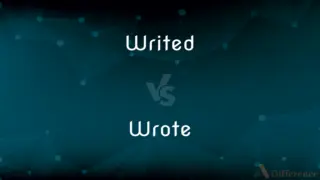
Previous Comparison
Writed vs. Wrote
Next Comparison
Shily vs. ShylyAuthor Spotlight
Written by
Maham LiaqatEdited by
Tayyaba RehmanTayyaba Rehman is a distinguished writer, currently serving as a primary contributor to askdifference.com. As a researcher in semantics and etymology, Tayyaba's passion for the complexity of languages and their distinctions has found a perfect home on the platform. Tayyaba delves into the intricacies of language, distinguishing between commonly confused words and phrases, thereby providing clarity for readers worldwide.

